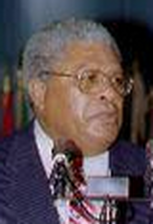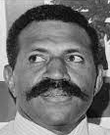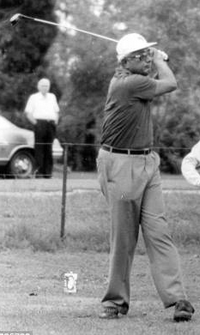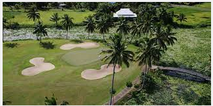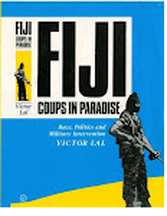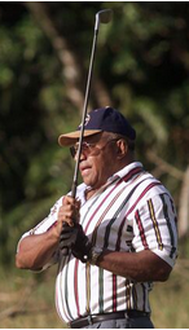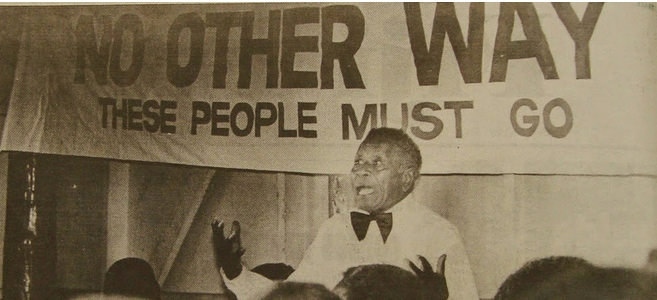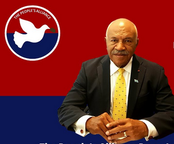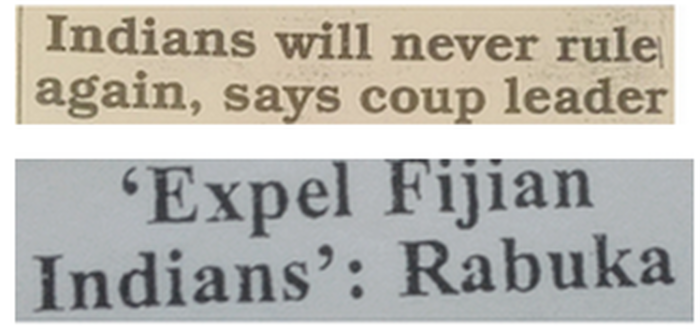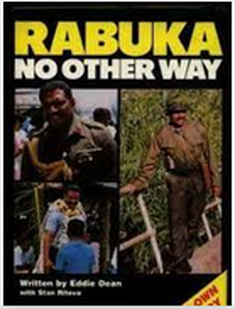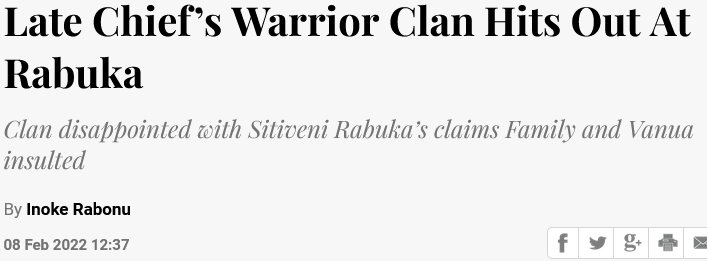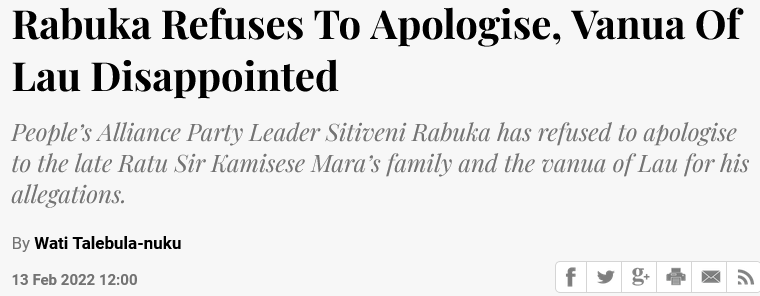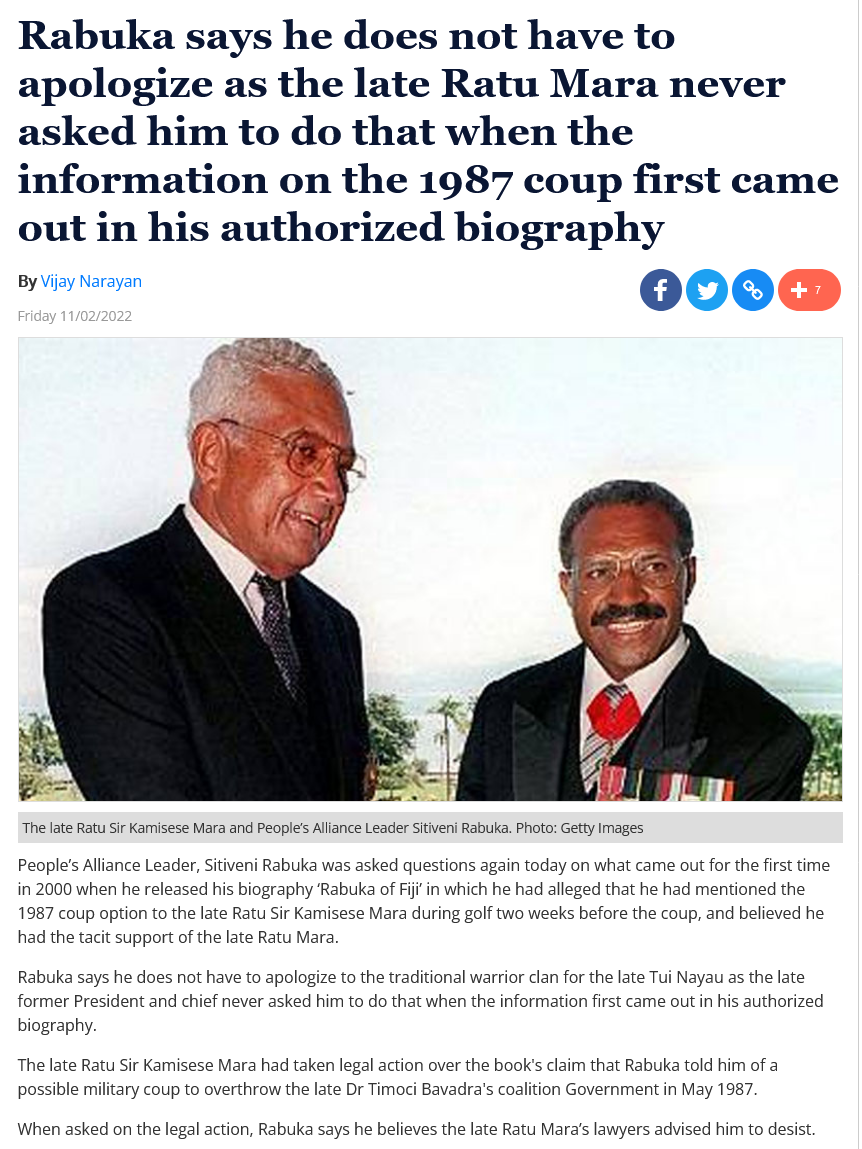UNCLE MILITONI LEWENIQILA TO NEPHEW SITIVENI RABUKA:
"IF you are going to successfully execute a coup, you may have to take some lives for people to believe there is [one] because no one believes a coup is possible in Fiji.[Also] that a coup will be economically disastrous for the country...You have to go to Government House first and remove His Excellency [Ratu Sir Penaia Ganilau] as Governor-General, then take over Radio Fiji.'
The Alliance MP and SPEAKER of Fiji's Parliament LEWENIQILA.
Rabuka had confided to his uncle Lewenqila two weeks before his treasonist COUP on 14 May 1987. Leweniqila was in the Speaker's chair when Rabuka entered Parliament, nodded at his uncle, and sat in the Visitor's Gallery
And what of the role of another promiment figure-Ratu Mara? He and Rabuka were 'seen playing golf-separately-at Pacific Harbour Gold and Country Club, 40 km west of Suva.
Fijileaks: After the 1987 Coups, Leweniqila, an old friend of our Editor's family from their Alliance Party days, told our Editor for his book, Fiji: Coups in Paradise that the discussion with Rabuka was NEVER intended to be translated into practice, and he still 'feels guilty that he failed to order the Sergeant-at-Arms to STOP Rabuka and his men'. As regards the late President Ratu Sir Kamisese Mara, the COUPIST is lying about the role the great Lauan chief played before the COUP.
Fijileaks: Most who have emerged as overnight experts on the 1987 coups, and are trying very hard to whitewash Sitiveni Rabuka's crimes, including ONE Essex sounding propagandist AJAY BHAI AMRIT from the People's Alliance Party, are misleading the voters and the general public.
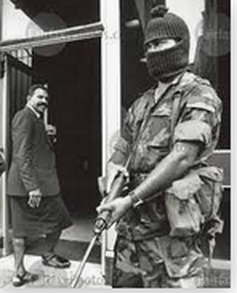
Excerpt from VICTOR LAL: Fiji: Coups in Paradise:
And what of the role of another promiment figure-Ratu Mara? He and Rabuka were 'seen playing golf-separately-at Pacific Harbour Gold and Country Club, 40 km west of Suva.
Rabuka has denied widespread speculation that Ratu Mara helped plot the coup. According to Ritova and Dean [No Other Way], Rabuka met Ratu Mara and his Samoan guests at the golf course and the latter invited Rabuka for lunch. At lunch there was wide range of casual talk and local politics, naturally enough, were raised. Rabuka was interested in Ratu Mara's opinion about the way things were heading, and his views on the status of the 1970 Constitution:
"We were talking about politics, and I asked how can the [1970] Constitution be changed? He [Mara] said the Constitution could not now be changed. The only way to change it-and to use his exact words-'is to throw it out and make a new one, and the likelihood of that is nil.'
Rabuka thinks, according to Ritova and Dean, Ratu Mara was speaking lightly, more in jest then seriousness, for the benefit of his guests, but a week later they were sharing power in Rabuka's government. When the first coup occurred, in May, Ratu Mara was co-chairing the meeting of the Pacific Democratic Union (PDU) at The Fijian hotel. Although maintaining that he had NO prior knowledge of the coup, he told a veteran Fiji journalist, Robert Keith-Reid, while on his way to meet Rabuka on 15 May, that he first heard of the military takeover at 9am on Thursday (the coup occurred at 10am) and was shocked and saddened. But after Rabuka had called on him at The Fijian for help he agreed to serve on the Council of Ministers as Minister for Foreign Affairs, an action he later justified in the following terms:
"I had to do it, because if my house was on fire with my family inside...why should I wait? I must try and rescue them. At our first meeting, Col Rabuka told us that he was a soldier and did not want to run the government...the sooner he gets back to the camp the better it would be for all. Col Rabuka then appointed me to look for ways and means of bringing about a quick return to normal life. In fact I was his matani vanua (spokesman) to Government House, until both he and the Governor-General agreed that I should advise them, because a lot of people were saying that I was responsible for bringing about the crisis, claiming there were many loopholes in the Constitution. I have now done my best in trying to rectify that matter. When Col Rabuka's constitutional council decide[s] on something, it will be good for you, and the nation as a whole.'
Ratu Mara's acceptance of a post in Rabuka's interim government, instead of condemning the racial motivation that lay behind it, cast doubts upon the sincerity of his professed belief in the concept of multiracialism. While the Australian Prime Minister [Bob] Hawke condemned the coup, his acting Foreign Affairs Minister, Senator Gareth Evans, questioned Ratu Mara's role as a member of the new government. He said Ratu Mara's earlier statements about how shocked he was by the coup appeared to be at variance with his new posiition. Prime Minister [David] Lange of New Zealand added: 'I believe a word three or four weeks ago from Ratu Mara in support of the constitutional process would have averted all this.'
And what of the role of another promiment figure-Ratu Mara? He and Rabuka were 'seen playing golf-separately-at Pacific Harbour Gold and Country Club, 40 km west of Suva.
Rabuka has denied widespread speculation that Ratu Mara helped plot the coup. According to Ritova and Dean [No Other Way], Rabuka met Ratu Mara and his Samoan guests at the golf course and the latter invited Rabuka for lunch. At lunch there was wide range of casual talk and local politics, naturally enough, were raised. Rabuka was interested in Ratu Mara's opinion about the way things were heading, and his views on the status of the 1970 Constitution:
"We were talking about politics, and I asked how can the [1970] Constitution be changed? He [Mara] said the Constitution could not now be changed. The only way to change it-and to use his exact words-'is to throw it out and make a new one, and the likelihood of that is nil.'
Rabuka thinks, according to Ritova and Dean, Ratu Mara was speaking lightly, more in jest then seriousness, for the benefit of his guests, but a week later they were sharing power in Rabuka's government. When the first coup occurred, in May, Ratu Mara was co-chairing the meeting of the Pacific Democratic Union (PDU) at The Fijian hotel. Although maintaining that he had NO prior knowledge of the coup, he told a veteran Fiji journalist, Robert Keith-Reid, while on his way to meet Rabuka on 15 May, that he first heard of the military takeover at 9am on Thursday (the coup occurred at 10am) and was shocked and saddened. But after Rabuka had called on him at The Fijian for help he agreed to serve on the Council of Ministers as Minister for Foreign Affairs, an action he later justified in the following terms:
"I had to do it, because if my house was on fire with my family inside...why should I wait? I must try and rescue them. At our first meeting, Col Rabuka told us that he was a soldier and did not want to run the government...the sooner he gets back to the camp the better it would be for all. Col Rabuka then appointed me to look for ways and means of bringing about a quick return to normal life. In fact I was his matani vanua (spokesman) to Government House, until both he and the Governor-General agreed that I should advise them, because a lot of people were saying that I was responsible for bringing about the crisis, claiming there were many loopholes in the Constitution. I have now done my best in trying to rectify that matter. When Col Rabuka's constitutional council decide[s] on something, it will be good for you, and the nation as a whole.'
Ratu Mara's acceptance of a post in Rabuka's interim government, instead of condemning the racial motivation that lay behind it, cast doubts upon the sincerity of his professed belief in the concept of multiracialism. While the Australian Prime Minister [Bob] Hawke condemned the coup, his acting Foreign Affairs Minister, Senator Gareth Evans, questioned Ratu Mara's role as a member of the new government. He said Ratu Mara's earlier statements about how shocked he was by the coup appeared to be at variance with his new posiition. Prime Minister [David] Lange of New Zealand added: 'I believe a word three or four weeks ago from Ratu Mara in support of the constitutional process would have averted all this.'
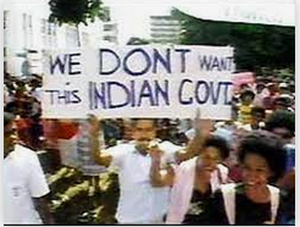
In an interview Ratu Mara gave to a New Zealand television team throws light on some of the questions raised shortly after the coup.
Q: Sir, you were subjected to some very harsh criticism from the Prime Ministers of Australia and particularly New Zealand. They claim you either could have stopped it or were possibly involved in the coup. What was the story? One of the criticisms that Mr Lange made against you was that you failed to say anything or do anything about the Taukei Movement, the marchers and the growing discontent, Do you think in retrospect that you should have done (more) about Apisai Tora and what he was doing?
A: No, Apisai Tora and the other leaders were merely mouthpieces of the crowd, or people who have been meeting, and they were marching against the Constitution that I helped to construct and I couldn't understand why people ask me to say something. It'll be thrown back at my face and I wouldn't have any position to speak on later, if I had made a bid then.'
As to the 1970 Constitution, Ratu Mara lay blame elsewhere: 'I felt that the Constitution was right and I had consulted a constitutional expert, David Butler by name, and his opinion was that the Constitution is right and [if] the Fijians stay united, we should still have power for a long time.' He went on to state that the 'egg has been broken now. We cannot go back to the Constitution in which we enjoyed peace and stability for a long time and we have to find a Constitution that has to accommodate what has now been shown quite clearly: the wish of the indigenous people.'
Q: Sir, you were subjected to some very harsh criticism from the Prime Ministers of Australia and particularly New Zealand. They claim you either could have stopped it or were possibly involved in the coup. What was the story? One of the criticisms that Mr Lange made against you was that you failed to say anything or do anything about the Taukei Movement, the marchers and the growing discontent, Do you think in retrospect that you should have done (more) about Apisai Tora and what he was doing?
A: No, Apisai Tora and the other leaders were merely mouthpieces of the crowd, or people who have been meeting, and they were marching against the Constitution that I helped to construct and I couldn't understand why people ask me to say something. It'll be thrown back at my face and I wouldn't have any position to speak on later, if I had made a bid then.'
As to the 1970 Constitution, Ratu Mara lay blame elsewhere: 'I felt that the Constitution was right and I had consulted a constitutional expert, David Butler by name, and his opinion was that the Constitution is right and [if] the Fijians stay united, we should still have power for a long time.' He went on to state that the 'egg has been broken now. We cannot go back to the Constitution in which we enjoyed peace and stability for a long time and we have to find a Constitution that has to accommodate what has now been shown quite clearly: the wish of the indigenous people.'
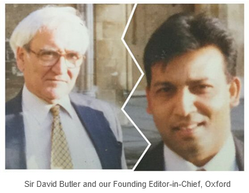
(Fijileaks: David Butler that Ratu Mara was referring to is Sir David Butler of Nuffield College, Oxford, under whose academic supervision our Editor had written this very book between 1984-1987. When our Editor showed Ratu Mara's international press statement, Dr Butler asked that his reply be added to the book: 'If the Fijians had stayed united Bavadra wouldn't have won'. I may have said what Ratu Mara attributes to me about the Constitution but I said this, not as a constitutional expert but as a sensible observer, that as long as Fijians remained united, they would always have power in Fiji.'
What did Ratu Mara know about the coup? When did he know?
A VICE-PRESIDENT of the Fiji Labour Party, SIMIONE DURUTALO, said Ratu Mara 'has kidnapped democracy and destroyed his own creation, the 1970 Fiji Constitution. He told Radio New Zealand in an interview from Hawaii (where he had fled with his wife and children on the day of the coup), that 'RABUKA IS JUST A PAWN'. The real man behind the coup is Ratu Sir Kamisese Mara and others in the Alliance Party'. Ratu Mara, said Durutalo, during his 17 years in power had 'pretended to the world that he was a multi-racial man and that he was for democracy'.
Fijileaks: Our Founding Editor-in-Chief grew up in the presence of Ratu Sir Kamisese Mara, Ratu Sir Penaia Ganilau and Ratu Sir George Cakobau as part of a political family closely associated with the Alliance Party (and the Indian Alliance) since its founding in the 1960s. He later campainged for Ratu Sir Penaia and Ratu Sir George in the 1970s for their Tailevu seats in the elections. His own uncle was Alliance Party's Lord Mayor of Suva and his uncle contested elections, twice, against NFP's Mrs Irene Jai Narayan for the Suva Indian communal seat. Mrs Narayan, after the 1987 coup, joined Rabuka's Council of Ministers.
We DON'T believe that Ratu Mara was a co-conspirator with Sitiveni Rabuka but came onboard after the 14 May 1987 coup. Ratu Mara was actuely aware of the dislike of the Lauans on the mainland of Viti Levu.
On 9 October 1975, the firebrand Fijian nationalist Sakiasi Butadroka introduced a motion in Parliament for the explusion of Indo-Fijians from Fiji:
'That this House agrees that the time has arrived when Indians or people of Indian origin in this country be repatriated back to India and that their travelling expenses back home and compensation for their properties in the country be met by the British government.'
Ratu Mara described the motion as a 'pernicious doctrine, a despicable doctrine that a politician resorts to only after he has known that he is a hopeless case as a politician'.
He reminded his fellow Lauans: 'Today, it is the Indians. Tomorrow it will be Chinese, Europeans and Part-Europeans. The next it will be Lauans who must be sent back to Lau.'
Fijileaks: Our Founding Editor-in-Chief grew up in the presence of Ratu Sir Kamisese Mara, Ratu Sir Penaia Ganilau and Ratu Sir George Cakobau as part of a political family closely associated with the Alliance Party (and the Indian Alliance) since its founding in the 1960s. He later campainged for Ratu Sir Penaia and Ratu Sir George in the 1970s for their Tailevu seats in the elections. His own uncle was Alliance Party's Lord Mayor of Suva and his uncle contested elections, twice, against NFP's Mrs Irene Jai Narayan for the Suva Indian communal seat. Mrs Narayan, after the 1987 coup, joined Rabuka's Council of Ministers.
We DON'T believe that Ratu Mara was a co-conspirator with Sitiveni Rabuka but came onboard after the 14 May 1987 coup. Ratu Mara was actuely aware of the dislike of the Lauans on the mainland of Viti Levu.
On 9 October 1975, the firebrand Fijian nationalist Sakiasi Butadroka introduced a motion in Parliament for the explusion of Indo-Fijians from Fiji:
'That this House agrees that the time has arrived when Indians or people of Indian origin in this country be repatriated back to India and that their travelling expenses back home and compensation for their properties in the country be met by the British government.'
Ratu Mara described the motion as a 'pernicious doctrine, a despicable doctrine that a politician resorts to only after he has known that he is a hopeless case as a politician'.
He reminded his fellow Lauans: 'Today, it is the Indians. Tomorrow it will be Chinese, Europeans and Part-Europeans. The next it will be Lauans who must be sent back to Lau.'
Shortly after the 14 May coup, Sakiasi Butadroka had joined Rabuka's Cabinet as Lands and Minerals Minister. He described RATU MARA as
'the bastard who sold Fiji'; 'the bloody Judas Iscariot'.
IN BUTADROKA'S BOOTS:
Coupist borrowed the title of his book to boast about his deeply racist 1987 Coups from Butadroka's slogan: NO OTHER WAY
So, COUPIST and SERIAL LIAR and LIU MURI
"DUNA" is lying about Ratu Mara and the 1987 Coup
Lets see how many LAUANS will run and apply to contest election under 'Duna' Rabuka's PAP Banner
“I personally think, for him to use our chief’s name now and talk about his involvement is simply to gain political mileage. It hurts us, because our paramount chief has been dragged into the gutter politics of Rabuka.
Why did he not make such a revelation when Ratu Mara was alive, it is unjustified for him to try to make these claims now. This is treachery, liumuri.”
Sisaro Temo from the bati-leka clan of Yadrana Village in Lakeba, Lau
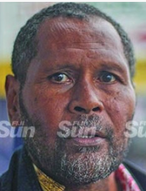 SISARO TEMO
SISARO TEMO
The traditional warriors (bati-leka clan) of the late Tui Nayau and Tui Lau Ratu Sir Kamisese Mara have hit out at Sitiveni Rabuka’s claims.
Mr Rabuka, alleged in an interview with a former Fijian broadcaster, that the late Ratu Sir Kamisese knew about his May 1987 military coup.
He claimed Ratu Sir Kamisese supported his plans to overthrow the Dr Timoci Bavadra-led Fiji Labour Party-National Federation Party coalition government.
Sisaro Temo from the bati-leka clan of Yadrana Village in Lakeba, Lau said they were disappointed and saddened that Mr Rabuka used the late Tui Nayau’s name, when he had died almost 18 years ago.
Mr Temo is the clan leader based in Suva.
“I personally think, for him to use our chief’s name now and talk about his involvement is simply to gain political mileage,” Mr Temo said.
“It hurts us, because our paramount chief has been dragged into the gutter politics of Rabuka,” he said.
“Why did he not make such a revelation when Ratu Mara was alive, it is unjustified for him to try to make these claims now. This is treachery, liumuri.”
He said it was not only disrespectful but totally unacceptable and unbecoming of a political leader like Mr Rabuka to accuse a high chief of treason when he was not here to defend himself.
Mr Rabuka had insulted Ratu Sir Kamisese, his family, the Vanua, traditions and culture.
“Where is the respect? Especially when our chief has passed on.
“For us, we are insulted, making allegations using the name of our late chief is disrespectful. It is very disrespectful.”
He said it was their duty as a bati to protect and defend the Tui Nayau and his family
“What is he trying to achieve from doing this? Even until death he is still trying to drag his name down.”
Attempts to contact Mr Rabuka yesterday were unsuccessful. The Fiji Sun has been told that Mr Rabuka was in his village in Vanua Levu and would return on Thursday..
Mr Rabuka, alleged in an interview with a former Fijian broadcaster, that the late Ratu Sir Kamisese knew about his May 1987 military coup.
He claimed Ratu Sir Kamisese supported his plans to overthrow the Dr Timoci Bavadra-led Fiji Labour Party-National Federation Party coalition government.
Sisaro Temo from the bati-leka clan of Yadrana Village in Lakeba, Lau said they were disappointed and saddened that Mr Rabuka used the late Tui Nayau’s name, when he had died almost 18 years ago.
Mr Temo is the clan leader based in Suva.
“I personally think, for him to use our chief’s name now and talk about his involvement is simply to gain political mileage,” Mr Temo said.
“It hurts us, because our paramount chief has been dragged into the gutter politics of Rabuka,” he said.
“Why did he not make such a revelation when Ratu Mara was alive, it is unjustified for him to try to make these claims now. This is treachery, liumuri.”
He said it was not only disrespectful but totally unacceptable and unbecoming of a political leader like Mr Rabuka to accuse a high chief of treason when he was not here to defend himself.
Mr Rabuka had insulted Ratu Sir Kamisese, his family, the Vanua, traditions and culture.
“Where is the respect? Especially when our chief has passed on.
“For us, we are insulted, making allegations using the name of our late chief is disrespectful. It is very disrespectful.”
He said it was their duty as a bati to protect and defend the Tui Nayau and his family
“What is he trying to achieve from doing this? Even until death he is still trying to drag his name down.”
Attempts to contact Mr Rabuka yesterday were unsuccessful. The Fiji Sun has been told that Mr Rabuka was in his village in Vanua Levu and would return on Thursday..
